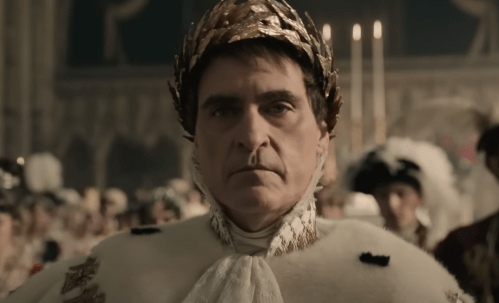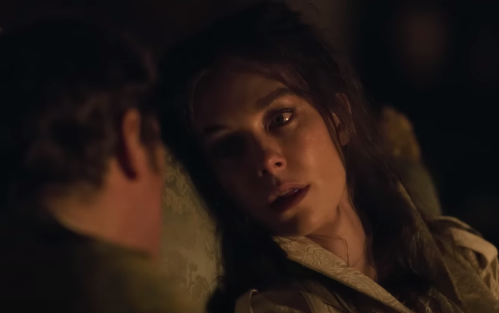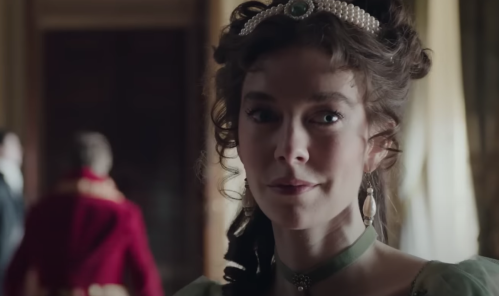When the upcoming historical biopic Napoleon hits theaters, it’ll include some unscripted moments. In a new interview with Empire, stars Joaquin Phoenix and Vanessa Kirby—who play Napoleon Bonaparte and Joséphine de Beauharnais—said that they made an agreement to “shock” each other during their scenes. Prior to filming, they mutually decided they wanted to create unexpected moments in the movie and therefore didn’t need to know in advance exactly what the other was going to do in any given scene. This led to an incident in which Phoenix slapped Kirby during a tense exchange between their characters.
Read on to see what the actors had to say about their approach to the film—which hits theaters Nov. 22—and why the surprise slap was no issue for Kirby.
RELATED: 7 Oscar-Winning Movies That Are Offensive by Today’s Standards.
In Napoleon, from director Ridley Scott, Phoenix stars in the title role while Kirby plays Napoleon’s first wife, Joséphine de Beauharnais. Napoleon and Joséphine were married from 1976 until 1810. During this time, they became the Emperor and Empress of France, as well as the King and Queen of Italy.
While Napoleon is remembered for many things, including his military campaigns, when it comes to his relationship with Joséphine, their legacy is the love letters that he sent to her, which were later published. When Joséphine and Napoleon ended their marriage, Napoleon married Archduchess Marie Louise of Austria.
It was during Napoleon and Joséphine’s divorce scene for the film that Phoenix slapped Kirby.
“We were using the real words from their divorce in the church,” Kirby told Empire of filming the scene. “When that happens, you can faithfully go through an archival re-enactment of it and read out the lines and then go home. But we always wanted to surprise each other.”
The Crown star continued, “It’s the greatest thing when you have a creative partner and you say, ‘Right, everything’s safe. I’m with you. And we’re gonna go to the dark places together.'”
For more celebrity news delivered right to your inbox, sign up for our daily newsletter.

In the same interview, Phoenix said that he and Kirby agreed that they didn’t want their scenes to feel overly choreographed and instead wanted to surprise each other.
“She said, ‘Look, whatever you feel, you can do,'” Phoneix said of his co-star. “I said, ‘Same thing with you.’ She said, ‘You can slap me, you can grab me, you can pull me, you can kiss me, whatever it is.’ So we had this agreement that we were going to surprise each other and try and create moments that weren’t there, because both of us wanted to avoid the cliché of the period drama. And by that I mean moments that are well-orchestrated and designed.”
The Oscar-winner added of their characters’ complex relationship. “We never really got to the bottom of it. I don’t know if you can call it love. I don’t know what it was. But we encouraged each other, demanded of each other, to challenge ourselves to shock each other in moments. And that’s what came out of that, that moment.”
RELATED: Richard Dreyfuss Says It’s “Crazy” That He Will “Never Have a Chance to Play a Black Man.”

In a May interview with Harper’s Bazaar UK, Kirby talked about the preparation that went into playing Joséphine before she was on set.
“I got so into her, I read all the books. I went to her house and to her tomb,” Kirby said. “You go to Napoleon’s tomb and it is literally huge, like beyond, and hers is tiny, in the corner of a church, way outside of Paris. This woman had the most extraordinary life. You could do 10 hours on her, but he was the one who fought all the battles.”
As for Phoenix, Scott explained how he shaped the film in a December 2022 interview with Empire. “Joaquin is about as far from conventional as you can get. Not deliberately, but out of intuition. That’s what makes him tick. If something bothers him, he’ll let you know,” the director said. “He made [Napoleon] special by constantly questioning.”
Scott added that this led to changes in the script. “With Joaquin, we can rewrite the [expletive] film because he’s uncomfortable. And that kind of happened with Napoleon,” he said. “We unpicked the film to help him focus on who Bonaparte was. I had to respect that, because what was being said was incredibly constructive. It made it all grow bigger and better.”

